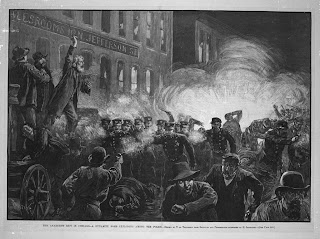 Tommorow, or actually today, as I prepare to post this at midnight, I plan on attending Tucson's May Day March and Rally for Immigrant and Workers' Rights, sponsored by the Tucson's May 1st Coalition and Coalicion de Derechos Humanos. Glad I had found out about this. For years now I have been pretty isolated from peoples' popular movements, and this should give me a chance to at least connect a little with people in the streets, fighting the good fight. I will try to remember my ancient digital camera (yes, really, I have 1st generation digital camera thats kind of shitty) and post some photos. That would be cool!
Tommorow, or actually today, as I prepare to post this at midnight, I plan on attending Tucson's May Day March and Rally for Immigrant and Workers' Rights, sponsored by the Tucson's May 1st Coalition and Coalicion de Derechos Humanos. Glad I had found out about this. For years now I have been pretty isolated from peoples' popular movements, and this should give me a chance to at least connect a little with people in the streets, fighting the good fight. I will try to remember my ancient digital camera (yes, really, I have 1st generation digital camera thats kind of shitty) and post some photos. That would be cool!I really wanted to write something myself for this May 1st on the history of the holiday, but I am kind of short on time, moving and all, so instead I am going to "steal", or more appropriately quote at length an article from Tucson's May 1st Coalition web site, and attributed to M.L. Gaylord. Lest we forget the struggles of those who came before us, so that we forget to fight for a decent future for working people.

"In 1884, the Federation of Organized Trades and Labor Unions passed a resolution stating that eight hours would constitute a legal day's work from and after May 1, 1886. The resolution called for a general strike to achieve the goal, since legislative methods had already failed. With workers being forced to work ten, twelve, and fourteen hours a day, rank-and-file support for the eight-hour movement grew rapidly, despite the indifference and hostility of many union leaders. By April 1886, 250,000 workers were involved in the May Day movement.
The heart of the movement was in Chicago, organized primarily by the anarchist International Working People's Association. Businesses and the state were terrified by the increasingly revolutionary character of the movement and prepared accordingly. The police and militia were increased in size and received new and powerful weapons financed by local business leaders. Chicago's Commercial Club purchased a $2000 machine gun for the Illinois National Guard to be used against strikers. Nevertheless, by May 1st, the movement had already won gains for many Chicago clothing cutters, shoemakers, and packing-house workers. But on May 3, 1886, police fired into a crowd of strikers at the McCormick Reaper Works Factory, killing four and wounding many. Anarchists called for a mass meeting the next day in Haymarket Square to protest the brutality.
The meeting proceeded without incident, and by the time the last speaker was on the platform, the rainy gathering was already breaking up, with only a few hundred people remaining. It was then that 180 cops marched into the square and ordered the meeting to disperse. As the speakers climbed down from the platform, a bomb was thrown at the police, killing one and injuring seventy. Police responded by firing into the crowd, killing one worker and injuring many others.
Although it was never determined who threw the bomb, the incident was used as an excuse to attack the entire Left and labor movement. Police ransacked the homes and offices of suspected radicals, and hundreds were arrested without charge. Anarchists in particular were harassed, and eight of Chicago's most active were charged with conspiracy to murder in connection with the Haymarket bombing. A kangaroo court found all eight guilty, despite a lack of evidence connecting any of them to the bomb-thrower (only one was even present at the meeting, and he was on the speakers' platform), and they were sentenced to die. Albert Parsons, August Spies, Adolf Fischer, and George Engel were hanged on November 11, 1887. Louis Lingg committed suicide in prison; the remaining three were finally pardoned in 1893.
It is not surprising that the state, business leaders, mainstream union officials, and the media
would want to hide the true history of May Day, portraying it as a holiday celebrated only in
Moscow's Red Square. In its attempt to erase the history and significance of May Day, the
United States government declared May 1st to be "Law Day", and gave us instead Labor Day - a holiday devoid of any historical significance other than its importance as a day to swill beer and sit in traffic jams.
would want to hide the true history of May Day, portraying it as a holiday celebrated only in
Moscow's Red Square. In its attempt to erase the history and significance of May Day, the
United States government declared May 1st to be "Law Day", and gave us instead Labor Day - a holiday devoid of any historical significance other than its importance as a day to swill beer and sit in traffic jams.
snip
By covering up the history of May Day, the state, business, mainstream unions and the media
have covered up an entire legacy of dissent in this country. They are terrified of what a similarly militant and organized movement could accomplish today, and they suppress the seeds of such organization whenever and wherever they can. As workers, we must recognize and commemorate May Day not only for it's historical significance, but also as a time to organize around issues of vital importance to working-class people today."
M.L. Gaylord





No comments:
Post a Comment